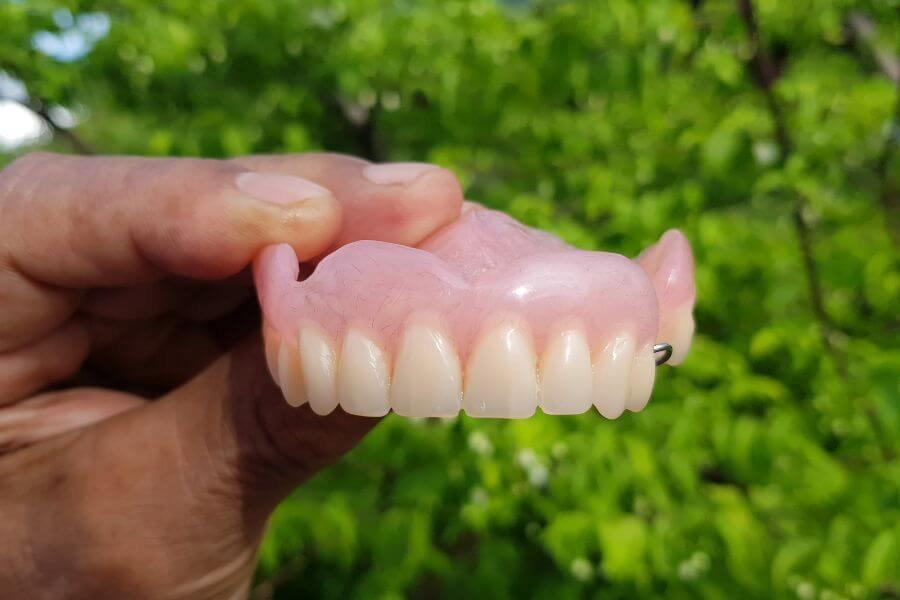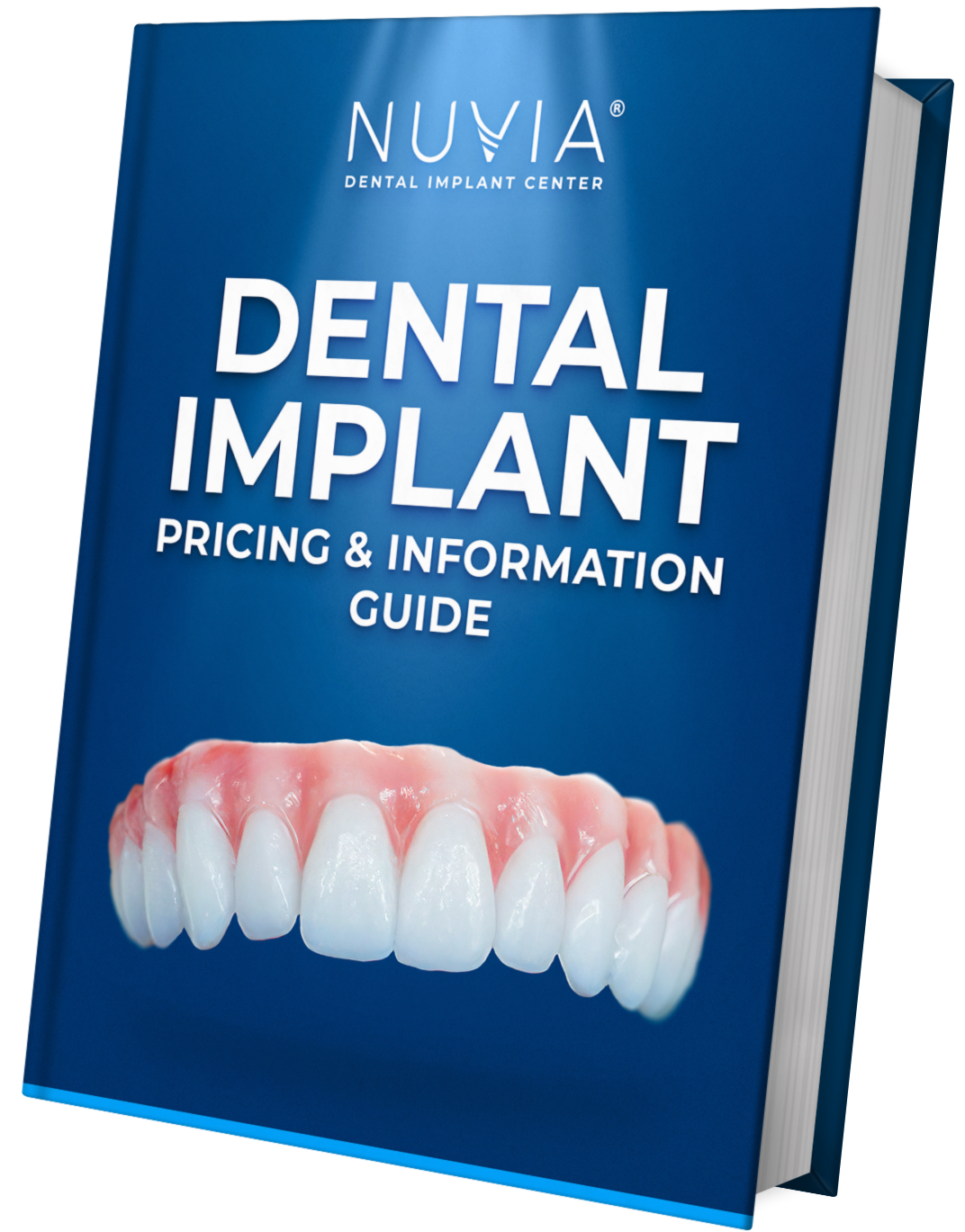
Are Dentures the Best Option for Elderly People?
Find Out If You May Be EligibleFor Permanent Teeth in 24 Hours
Get The Dental Implant Cost Guide

Are Dentures the Best Option for Elderly People?
Another way to ask that question is, “what tooth replacement option will allow you to eat healthy protein and vegetables with the least amount of issues as possible?”
Not every answer is black and white. There are factors that vary for different people and those factors have to be considered when answering questions—especially when it involves your health.
So when it comes to replacing their teeth with dentures, covering all of your bases is crucial. You cannot just assume it’s fine to get dentures without examining the pros and cons.
Are Dentures the Best Option for Elderly People?
Aaaaand we’re gonna say it again. You guessed it. There is no black-and-white answer. So, we’re going to give you the information you need to make a more educated decision.
We’ll start with the basics.
Dentures are removable prosthetic devices made of a hard plastic used to replace missing teeth. They are able to remain in the mouth because they rest on gum and bone tissue. There is also a layer of saliva in between the device and the gums that creates suction. Typically, the more surface area the denture covers, the greater the suction.
Pros and Cons Of The Upper Denture
The upper denture covers the entire roof of the mouth and therefore has much more surface area. Because of that, elderly folks usually have less issues with their upper dentures staying in.
While that sounds nice, if the entire upper palate is covered with the denture it makes it harder to taste food. Additionally, with the upper dentures not being secured by anything makes the embarrassing moments seen on ABC’s funniest home videos that much more possible.
Pros and Cons Of The Lower Denture
The lower denture if fit properly gives an opposing force that allows you to at least chew your food. However, several studies have shown that on average a person in dentures only has about ⅕ of their natural biting force which may give you an unexpected limit to what you can eat. Additionally, without much coverage on the bottom jaw denture patients generally have more issues with the lower than the upper. Even with a large amount of denture adhesive problems still arise.
Additional Things to Consider
Caring for Dentures requires a daily commitment.
The dentures must be removed nightly and thoroughly cleaned. The dentures must be removed, rinsed with water (should be hot or warm water which can cause warping), brushed clean with an appropriate denture cleaner, rinsed again with cool water, and then stored in cool water.
Dentures can break easily.
If dentures are dropped onto a hard surface, or you bite down on hard food they can crack or break. So hands must be sure and steady when removing, cleaning, and inserting those dentures. You must also be aware and pay attention while eating harder foods.
Dentures require maintenance and follow-up appointments with a dental care provider.
If dentures are not fitting properly, something is wrong. Some signs of a poor fit are continued issues with speech and avoiding foods that are more challenging to chew. If a lunch plate always has meat left on it, then comfort may be an issue. This cannot be ignored.
Dentures contribute to bone loss.
Elderly people already have to be careful with bone loss, and dentures just speed up the process in their mouths. Wherever natural teeth roots are missing, you can expect bone atrophy. It’s a vicious cycle for denture wearers because this means they will need to be refitted multiple times.
Dentures come with their fair share of problems, and we would not recommend them as the best option for replacing missing teeth... So what other options are there?
What Other Options Are Available for Elderly People in Need of Tooth Replacement?
That is a great question! Let’s get to it.
Partial Dentures.
We’ve already given you the basics on a full set of dentures, but what about partials? Partials are removable dentures designed to replace a few of your teeth, rather than a full arch. The adjacent teeth must be healthy so the partial can be anchored to them for stability.
Just like a full set of dentures, partials must be removed nightly and cleaned. All of the concerns that come along with full dentures apply to partial dentures, as well.
Fixed Bridges.
A bridge can be used to replace one tooth or a few adjacent teeth. The teeth on either side of the bridge must be filed down to place a crown over them and then the false teeth will be held in place by attaching to the crowns. A fixed bridge can also be held in place by an implant. This is a much more secure way to replace a few missing teeth.
Using a fixed bridge would mean that you anticipate all of the other teeth remaining healthy and stable for years to come. If those teeth don't stay healthy, the bridge will begin to fail and another solution will need to be found.
Standard Dental Implants.
The patient will require surgery to have standard dental implants placed in their mouth. Implants can be partial or full and require that a post is screwed into the jawbone as an anchor.
This post mimics the tooth root and prevents bone loss. What’s more, once a patient has healed from surgery, implants tend to be as durable as natural teeth. This means that eating can be normal again! Lastly, implants should last a lifetime and the maintenance is minimal.
Nuvia Dental Implants. Now, your first thought might be, What’s so special about Nuvia dental implants? Why are they different from standard implants? Instead of putting you in a temporary set of teeth again made of acrylic (plastic), you get a new permanent set of teeth anchored to dental implants in just 24 hours. These teeth are fixed in and DO NOT come out unless you see a dental implant provider.
This is great news for our older patients who prove to be good candidates. They can come in on a Tuesday and before the end of the day Wednesday, they can walk out with a perfectly healthy smile and eat real food when they leave.
In the End
There are clearly risks to having dentures when you are an elderly patient.
Nuvia dental implant center provides a permanent solution that eliminates problems you would have with dentures.
Everyone deserves to smile and eat their favorite foods without worry or pain.
Find out if you may be eligible for Dental Implant by taking the 60 second quiz below.
More Articles Like This one

How Long Dental Implants Last

5 Essential Steps for Choosing the Right Dental Implant Center






